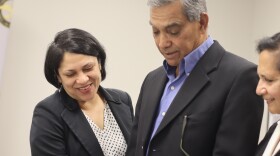Special interest groups are pouring money into nonpartisan judicial races in Kentucky, raising questions about political influence in the state courts system.
Organizations like the conservative Fair Courts America, the Republican State Leadership Committee for Judicial Fairness and the progressive Liberty & Justice for Kentucky are throwing their financial support behind judicial candidates, who aren’t supposed to have a political affiliation under state law.
Charles Boteler, a member of the nonprofit Kentucky Judicial Campaign Conduct Committee and former circuit judge, said the large amounts of money flooding in undermines the court’s role as an impartial arbitrator.
“When we diminish the power of the courts and make them less independent and more dependent on the other branches or political parties or interest groups, that harms the system,” he said.
The groups have primarily focused on races for two state Supreme Court seats–one in the northern Kentucky area, the other around Bowling Green–and a contest in Franklin Circuit Court, which handles some of the state’s most controversial cases, including constitutional challenges to state laws.
The large checks come as the courts are poised to tackle lawsuits dealing with weighty issues like abortion and redistricting.
Boteler said voters shouldn’t make their decisions about judicial candidates based on partisan issues.
“Most of the work a judge does has nothing to do with some of these hot button issues. So if you vote solely on the basis of whether one is Republican or Democrat or what somebody thinks about abortion, that doesn’t tell you a lot about how they would rule on cases,” he said.Partisan money in nonpartisan races
Three races have drawn the most money and attention from the groups, which are called unauthorized campaign committees. The organizations can accept contributions of any size from people, companies or groups and then spend an unlimited amount on advertisements like mailers and TV commercials.
The contest for the 6th District Kentucky Supreme Court seat in northern Kentucky between incumbent Justice Michelle Keller and GOP state Rep. Joe Fischer already received scrutiny for its openly partisan nature. Fischer is an anti-abortion state legislator and runs his campaign with the tagline “the conservative Republican.”
The Republican State Leadership Committee’s Judicial Fairness Initiative boosted Fischer’s campaign with a $375,000 contribution for a 30-second television ad according to a press release.
According to the Louisville Courier Journal, conservative group Fair Courts America is spending money on the District 2 Supreme Court race in support of Bowling Green lawyer Shawn Marie Alcott, who is running against Court of Appeals Judge Kelly Thompson.
And in the heated race for Franklin Circuit Court, Fair Courts America is sending out social media ads and mailers attacking incumbent Judge Phillip Shepherd. He’s running against Joe Bilby, a top attorney for Republican Agriculture Commissioner Ryan Quarles.
The group Liberty & Justice for Kentucky has raised $554,250, with $250,000 spent on radio and TV ads. One of the organization’s major donors is the Kentucky Educators PAC, which has endorsed three candidates: Keller, Shepherd and Thompson.
University of Kentucky political science professor Stephen Voss said wealthy campaign donors are starting to see the advantage of investing in low-level judicial and local races over high-profile contests.
“The people who have flooded our campaign finance system with cash are starting to invest it much more wisely and efficiently. By focusing on these low level races, conservative or liberal donors are able to see that low level races will become the candidates for the high level races later,” Voss said.
Voss said voters usually rubber stamp the incumbent in judicial races. But with more money, mailers and ads going out, judicial elections that are usually under the radar and ignored have gained wider interest and engagement.
“If you talk about just regular voter perspective, trust in the judiciary is at a low, very low level. So both people on the left and the right have been cued toward understanding judges as policymakers, just like legislators are. Once the challengers in these low level races are starting to get enough money to put up a serious fight, then the voters get a real choice,” he said.
Elections for Kentucky’s Supreme Court are especially important this year, as justices are about to take up a challenge to the state’s near-total ban on abortion. Though the high court’s current seven-member panel will hear arguments over the lawsuit on Nov. 15, a week after Election Day, there’s a chance that the court won’t issue an opinion before the end of the year.
The stakes are always high for Franklin Circuit Court, which oversees legal challenges to state government and constitutional matters. Republicans, including former Gov. Matt Bevin, say Shepherd disproportionately rules against them, though a look at Shepherd’s record doesn’t support that claim.
The general election is on November 8th. You can find your polling location at govoteky.com.





